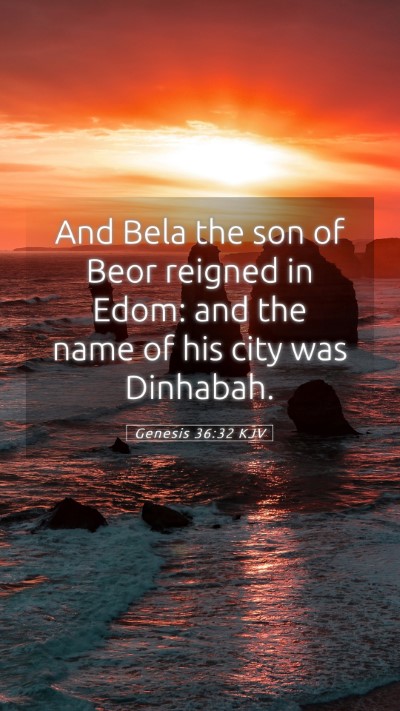Understanding Genesis 36:32
Genesis 36:32 states, "And Bela the son of Beor reigned in Edom: and the name of his city was Dinhabah."
Bible Verse Meaning
This verse is a brief historical record that provides insight into the lineage of Esau and the development of early tribes in Edom. The mentioning of Bela and the city of Dinhabah suggests a significant leadership role and the establishment of governance in this region.
Bible Verse Interpretations
According to Matthew Henry, this verse points to the establishment of a monarchy in Edom, marking the political organization of the Edomite people. Bela, as king, signifies authority and governance among the descendants of Esau. Henry emphasizes the importance of such historical figures, as they reflect God's providence in establishing nations.
Albert Barnes expands on this, noting that the name "Dinhabah" may have implications regarding its meaning and the cultural context of the Edomites. He suggests that the city, which appears to have been significant, illustrates the societal structure under which these early tribes operated.
Adam Clarke further interprets the political significance of this verse, observing that the kings mentioned are crucial to understanding the broader historical landscape of the region. Clarke highlights that this list of kings is vital for comprehending the evolution of Edom as a civilization following the legacy of Esau.
Scripture Analysis
This verse serves as part of a larger narrative about Esau’s descendants, illustrating both the historical and theological significance of Edom in relation to Israel. The genealogy of Esau is important for understanding the dynamics of conflict and kinship that exist in the biblical narrative.
Biblical Exegesis
In exegesis, we seek to extract meaning from the text. Genesis 36:32 provides insight into the Edomites' governance and suggests a continuity of political structure akin to that of Israel. It serves as a reminder of the intertwined histories of these two nations and their eventual destinies as outlined throughout the Scriptures.
Bible Study Insights
- Political Organization: The transition from family clans to a structured leadership is evident.
- Historical Context: Understanding who Bela was and the importance of his reign for the Edomites provides depth to our grasp of the biblical narrative.
- Cultural Significance: The name Dinhabah may yield clues about the culture and lifestyle of the Edomite people.
Meaning of Bible Verses
The verse encapsulates the beginnings of monarchy among Esau's descendants and highlights the ongoing theme of God’s sovereignty in the establishment of nations. It is an example of how even seemingly minor details in Scripture contribute to the overall understanding of biblical history.
Understanding Scripture
To truly understand this verse, one might first consider the broader narrative of Genesis, particularly the conflict between Isaac's lineage and that of Ishmael and Esau. This context gives us guidelines on interpreting the significance of the Esau line, represented here by Bela’s kingship.
Cross References
- Genesis 36:1-19 - The genealogy of Esau and his descendants.
- Deuteronomy 2:4-5 - Instructions concerning Edom.
- Obadiah 1:18 - The fate of Edom in prophecy.
Conclusion
Genesis 36:32 elucidates an important aspect of Edomite history and governance, reflecting God's overarching plan in the development of nations. It is essential for anyone exploring bible verse meanings or seeking in-depth bible study insights to consider the implications of this text regarding historical and theological narratives.


